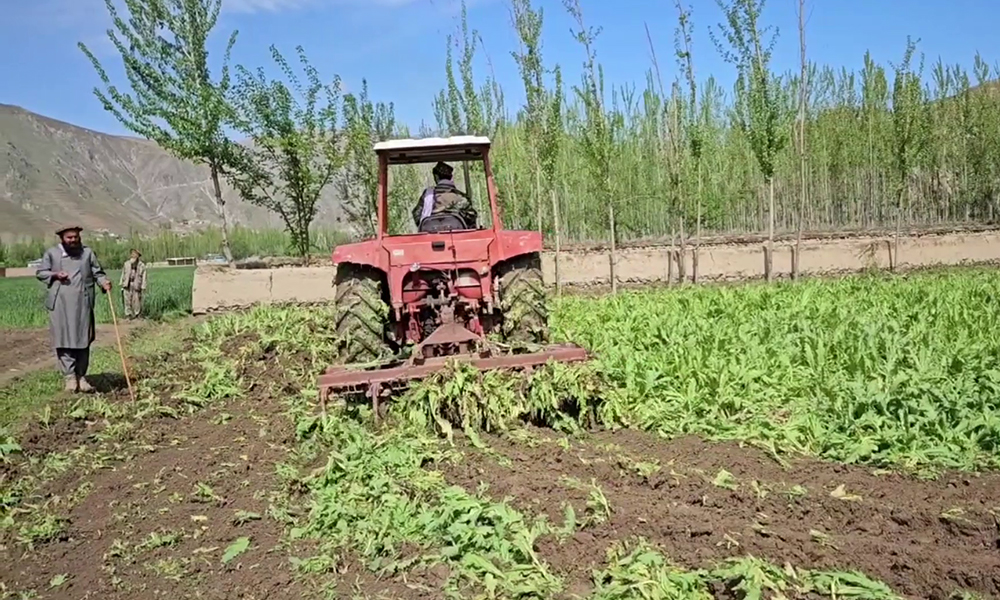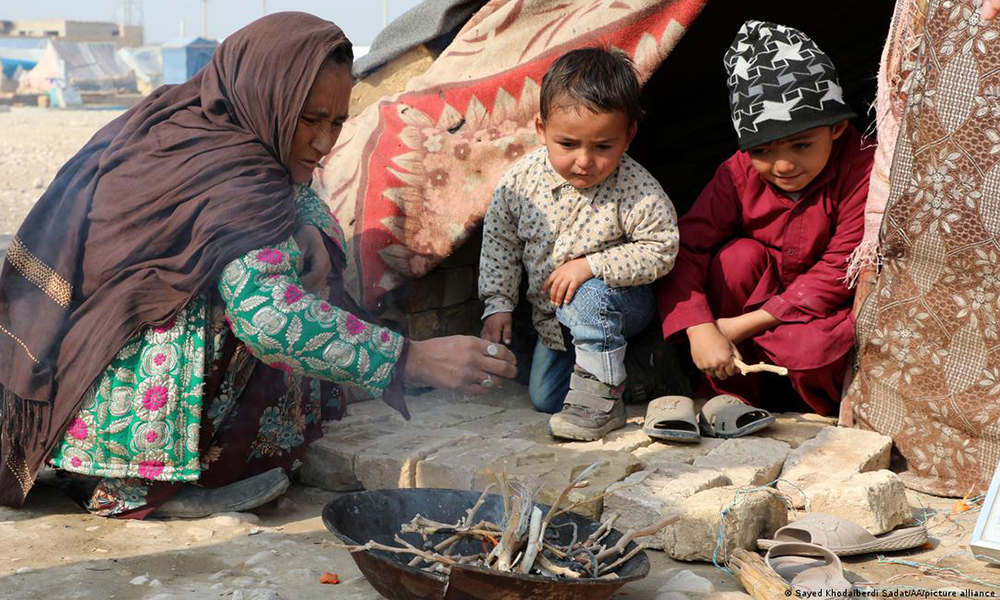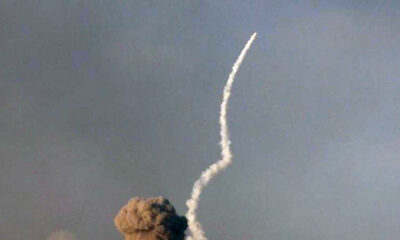Latest News
US ‘deeply troubled’ by attacks on civilians as Taliban sweep across Afghanistan

The United States said on Wednesday it was deeply troubled by reports of escalating attacks on civilians as the Taliban sweep across Afghanistan and Washington pulls out its last remaining troops and ends its longest war.
Secretary of State Antony Blinken, on a visit to India, said the only path to peace in Afghanistan was through negotiations, which all parties must take seriously.
Taliban insurgents have captured districts across Afghanistan and seized vital border control points in recent weeks, as Washington withdraws its last troops after 20 years. The Pentagon now estimates that the fighters control more than half of Afghanistan‘s district centres.
The surge has raised the prospect that the militants could return to power. Millions of people fled their extreme violence during their last period of rule from 1996-2001, when they staged public executions of their foes, banned women from work and education and hosted Osama bin Laden’s al Qaeda network.
The Taliban say they will treat civilians well if they return to power, and will not allow the country to be used as a base for international terrorism.
Describing reports of attacks on civilians as “deeply, deeply troubling”, Blinken said: “An Afghanistan that commits atrocities against its own people would become a pariah state.
“There’s only one path, and that’s at the negotiating table, to resolve the conflict peacefully.”
The United Nations reported this week that civilian casualties had been surging in recent weeks, with as many killed in May-June as in the previous four months. The report did not cover casualties in July, when fighting has intensified further.
Afghans in government-held areas have been alarmed by domestic media reports in recent days of abductions and killings of civilians in areas where the Taliban have advanced. The Taliban deny they are carrying out revenge killings.
U.S. President Joe Biden has ordered all U.S. troops out of the country, fulfilling a policy pledge made by his predecessor Donald Trump, despite warnings from American generals of the potential for renewed civil war without foreign troops to protect the Kabul government.
Peace talks between the government and the Taliban in Qatar have largely stalled, with the Taliban showing little interest in negotiating while they are gaining on the battlefield.
CHINA HOSTS TALIBAN DELEGATION
Taliban delegations have visited neighbouring countries in recent weeks, gaining international standing for a movement that had been treated as outcasts and banned as terrorists for most of the past two decades.
The latest regional power to host them was China, whose Foreign Minister Wang Yi met a nine-person delegation led by Taliban deputy leader Mullah Baradar Akhund in the northern Chinese city of Tianjin during a two-day visit.
Wang said the Taliban were expected to “play an important role in the process of peaceful reconciliation and reconstruction in Afghanistan“, according to a readout of the meeting from the Chinese Foreign Ministry.
Taliban delegations have also visited Iran and Russia in recent weeks. The group has an office in Qatar.
“Politics, economy and issues related to the security of both countries and the current situation of Afghanistan and the peace process were discussed in the meetings,” Taliban spokesperson Mohammed Naeem tweeted about the China visit.
“(The) delegation assured China that they will not allow anyone to use Afghan soil against China,” Naeem said. “China also reiterated its commitment of continuation of their assistance with Afghans and said they will not interfere in Afghanistan‘s issues but will help to solve the problems and restoration of peace in the country.”
Moscow, which fought for a decade in Afghanistan in the 1980s, said it was beefing up the combat capabilities at its military base in Tajikistan, a small former Soviet republic that borders Afghanistan.
Russian Defence Minister Sergei Shoigu, visiting Tajikistan on Wednesday, said the security situation had rapidly deteriorated in Afghanistan during a “hasty” U.S. withdrawal.
Shoigu said Islamic State fighters were moving into Afghanistan from countries including Syria and Libya, describing their arrival as “quite seriously organised”.
“We are paying increased attention to strengthening the combat capabilities of our base and refining plans to jointly repel possible insurgent infiltration,” he said.
A senior Russian diplomat has said Moscow views Taliban gains in northern Afghanistan as having a security upside because the group is hostile to what Russia regards as more dangerous Islamist extremists.
Russia is set to hold military drills on Aug. 5-10 near Tajikistan’s Afghan border, involving more than 1,000 Russian soldiers as well as Uzbek and Tajik forces.
Latest News
Over 6,000 acres of land cleared of poppies in Badakhshan

Badakhshan Police Command says it has cleared more than 6,000 acres of poppy fields in northern Badakhshan province.
The anti-narcotics department of Badakhshan Police Command says that since the beginning of the campaign to destroy the poppy fields in this province, they have cleared more than 6,000 acres of land.
According to these officials, poppies have however been planted in more than 10 districts this year.
The anti-narcotics department of the Badakhshan Police Command says that the campaign to destroy the poppy plantations started two months ago and continues.
According to the officials, during this period, 6,300 acres of land has been cleared.
Some of the farmers whose fields were destroyed say that poppy is more profitable than other agricultural products, but now that their land has been cleared, they want alternative crops.
According to the officials, Kishim, Argo, Darayimand and Jurm districts are among the districts where poppies are cultivated.
Latest News
MSF ‘deeply concerned’ over new phase of deportations of Afghans from Pakistan

Médecins Sans Frontières (MSF) said Wednesday it was deeply concerned for the rights and welfare of Afghan refugees in Pakistan in the wake of the recent announcement by Islamabad that it plans to start Phase Two of the deportation campaign.
Pakistan is home to an estimated 3.7 million Afghans, and a reported 500,000 have crossed the border so far.
Many Afghans living in Pakistan have been there for decades and have spent more time in the country than their country of origin, without any legal recourse to remain in the only place they can effectively call “home”.
For many Afghans, Islamabad’s “repatriation” campaign means packing up their belongings and carrying them on a horse, cart, car and bus and traveling en masse to a country that is already struggling with widespread poverty, inadequate health services and increased restrictions on women, MSF said in a statement.
The second phase of the deportations leaves an estimated 800,000 Pakistan-issued Afghan Citizen Card (ACC) holders vulnerable to return, while phase three is expected to result in the further deportation of UNHCR-issued Proof of Registration (PoR) card holders, MSF said.
MSF first started working in Pakistan in 1986, and today provides much-needed medical care to people in Balochistan, Khyber Pakhtunkhwa and Sindh provinces.
The Islamic Emirate of Afghanistan (IEA) and UN agencies estimate that more than half a million people have been deported from Pakistan or voluntarily returned to Afghanistan in the past six months.
The United Nations High Commissioner for Refugees said last month that nearly two million Afghan refugees are living in Pakistan and that the agency needs $368 million this year to assist these people.
Latest News
2023 marred by ‘tremendous challenges’ for Afghanistan

Last year, 2023, was a year of “tremendous challenges” for the people of Afghanistan, but it was also a year marked by resilience and determination, the Deputy Special Representative of the Secretary-General, Resident and Humanitarian Coordinator, Indrika Ratwatte, said in the UN’s annual report on Afghanistan that was published this week.
Ratwatte said: “In the face of adversity and multiple concurrent shocks, the people of Afghanistan have demonstrated remarkable courage and strength.”
Afghans now mention access to food as their most pressing need, he said adding that “unable to pay for or produce basic sustenance, millions face hunger and malnutrition.”
In 2024, an estimated 15.8 million people will experience crisis and emergency levels of food insecurity.
The majority of the population is unable to procure basic needs such as healthcare, food, livelihoods, and housing, the report stated.
The UN found that the country also remains vulnerable to climate change.
Following the worst drought in three decades, emerging El Niño conditions now threaten a new cycle of flooding and crop pests. In this context, lifesaving humanitarian aid has been crucial in preventing the collapse of the social fabric. It has also served to underpin the stability of the economy. Despite growing humanitarian needs, relevant funding cuts have forced humanitarian actors to prioritize the most vulnerable further, the report stated.
A Gallup poll found that 95 percent of the population consider themselves to be suffering. In addition to living in poverty, the average life expectancy in Afghanistan has been falling for the past five years.
The Herat earthquakes and unprecedented large-scale returns of refugees from neighbouring countries, including Pakistan and Iran, have shown the disruptive impact of recurrent shocks and underscored the need for sustained international engagement and support, the UN stated.
“As we embark on the next chapter, in 2024, it is imperative that we remain steadfast in our commitment to the principles of human rights, gender equality, and women’s Empowerment,” Ratwatte said.
“We will continue to include women as key partners in our work, to provide assistance ‘by women, for women’, and to tirelessly work for equal access to education in line with the demands we hear from Afghans in all areas of the country,” he said.
However, from an economic point of view, Afghanistan’s economy appears to be stabilizing at a low equilibrium level following a period of significant contraction since 2021.
The UN said in the report that growth barriers include severely restricted operations in the banking sector (including microfinance institutions), trade disruptions, and institutional issues hindering service delivery, including in the private sector.
“The sudden cessation of a significant amount of international aid and grants, which had accounted for 40 percent of the country’s Gross Domestic Product (GDP), along with a freeze on international reserves amounting to about US$9 billion and the imposition of international sanctions, caused a severe balance of payments, banking and payment systems crisis.
“Notably, financial restrictions have removed liquidity from the banking system,” the report stated.
Despite the crisis and a period of devaluation towards the end of the year, the AFN is 20 percent stronger than it was in 2021 due to currency export controls, UN cash shipments of US dollars into Afghanistan, and personalremittances.
Imports continued to surpass exports through 2023 and increased as the economy contracted.
“This appears to be a paradox: the currency appreciated while the trade deficit widened, suggesting that there might be other unidentified sources of financing besides US dollar cash shipments and remittances to support the account deficits,” the report read.
The UN also said that with its partners, it will work to initiate a dialogue with the Islamic Emirate on adjustments to regulatory frameworks and sustained public service delivery with the aim of creating a long-term and sustainable pathway to reduce aid dependency and put Afghanistan back on a path towards development
“In this regard, we reiterate our offer to the DFA for a dialogue and will work jointly with international partners, donors, and Afghans on how such engagement can be structured in a most productive way.”
-

 Sport5 days ago
Sport5 days agoACL draw to be broadcast live on ATN channels
-

 Regional5 days ago
Regional5 days agoIRGC chief warns of harsher response if Israel attacks Iran
-

 Sport4 days ago
Sport4 days agoACL fever grows as fixtures finalized
-

 World4 days ago
World4 days agoUS will not take part in any Israeli retaliatory action against Iran
-

 Latest News4 days ago
Latest News4 days agoOver 50 people dead in traffic accidents over Eid
-

 Latest News4 days ago
Latest News4 days agoUS identifies Kabul airport suicide bomber
-

 Business4 days ago
Business4 days agoAfghanistan-Kazakhstan chamber of commerce opens in Herat
-

 Latest News4 days ago
Latest News4 days agoGood rains enable DABS to increase power production in Kabul
























